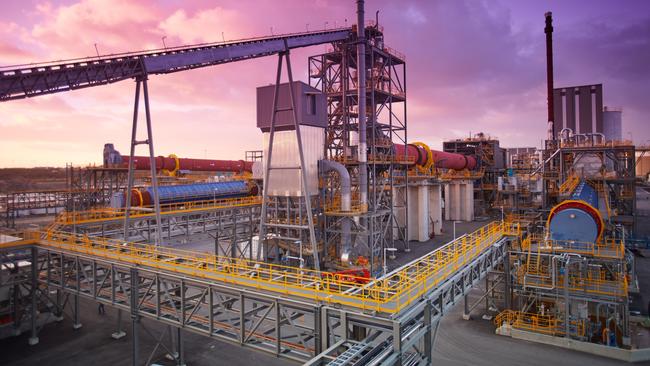Chinese lithium pioneer Tianqi says Albanese government needs to act to secure future of critical minerals supply chains
The Chinese company that pioneered lithium processing in Australia says the Albanese government needs to intervene now to secure the future of teetering critical minerals supply chains.

The Chinese company that pioneered lithium processing in Australia says the Albanese government needs to intervene now to secure the future of teetering critical minerals supply chains.
Tianqi’s head of operations in Australia made the call after striking a deal with Perth-based construction materials heavyweight BGC to cut waste management costs. Under the deal, BGC will use big volumes of the waste material from Tianqi’s troubled lithium hydroxide plant south of Perth in its products.
For every tonne of lithium hydroxide produced for use in electric vehicles and energy storage, about 10 tonnes of by-product is left behind, creating a major waste management nightmare for players in the battery supply chain.
Tianqi expects to save more than $32m a year on waste disposal costs if stage 1 of its Kwinana plant ever hits the target of producing 24,000 tonnes of lithium hydroxide a year.
The plant, part-owned by ASX-listed IGO, made history as the first of its kind built outside China but has never performed to expectations and is under growing pressure to survive the lithium rout.
Tianqi Lithium Energy Australia chief executive Raj Surendran welcomed a $150m West Australian government rescue package for lithium unveiled on Wednesday and said the commonwealth should double down with a separate assistance package.
Mr Surendran said cashflow was a major issue for lithium players after a collapse in prices that led some mines to shut down, with hundreds of job losses in WA.
The prolonged downturn has cast doubt on the future of both the Tianqi-IGO refinery, which employs about 350 people, and a similar plant in WA owned by New York-listed Albemarle. The three companies all have stakes in the Greenbushes mine in WA that is regarded as the world’s best hard rock lithium operation.

“The federal government could come with a not dissimilar package to what the state government is looking to provide for upstream miners in terms of interest free loans, in terms of relief from federal taxes – those things that will make a real difference to the current cashflow,” Mr Surendran said.
“No one’s making a lot of money, or any money at all, and hence why we are all sort of slowing down and shutting down. Cash is king so anything that can help alleviate that cashflow problem in the short to medium term would be really welcome.”
Tianqi and Albemarle are two of the foreign-owned entities that would qualify for a 10 per cent production tax credit that is central to the Albanese government’s future Made in Australia policy, but opposed by the Coalition. Mr Surendran backed the production tax credit policy but said any benefit was three years away. He said any immediate assistance could be repaid once prices improved, as required in the WA rescue package.
Shenzhen Stock Exchange-listed Tianqi, which has invested about $3bn in its WA assets, slumped to a $1.1bn loss over the first six months of 2024.
The deal with BGC, founded by the late entrepreneur Len Buckeridge, will allow the building materials company to replace imported high-carbon clinker with the aluminosilicate by-product from the Kwinana lithium refinery.
BGC estimates every tonne of cement produced with Tianqi aluminosilicate, known as TAS, will save almost one tonne of carbon emissions.
Tianqi already exports sodium sulphate by-product to customers in Asia to manufacture detergent, and is in talks with farming groups about using its gyplime by-product as a soil conditioner.
BGC chief executive Daniel Cooper said the TAS deal came after more than five years of research, development and collaboration with Tianqi that included laboratory and field trials.
“Our research indicates that TAS, when used in an optimised blend ratio, will outperform generic cement across several performance criteria, including later age strengths,” he said.
“TAS will initially be used in masonry products, concrete blocks and mining applications.”
It could also be used in blended cement and concrete if it is recognised as an approval ingredient under Australian standards.
Mr Cooper said BGC, which has put its cement division up for sale, was investing heavily in the use of TAS in its manufacturing process.
Mr Surendran said aluminosilicate made up the lion’s share of the 10 tonnes of by-product generated in producing every tonne of lithium hydroxide.
“Without beneficial uses, these products would end up in landfill at a cost of between $250 and $300 a tonne. This is neither financially nor environmentally sustainable,” he said.






To join the conversation, please log in. Don't have an account? Register
Join the conversation, you are commenting as Logout